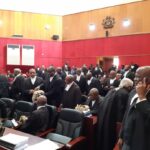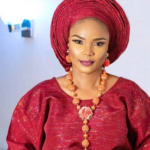Nigerians are inherently prone to divergent and conflicting opinions as to what is right, as such the constitution and resultant laws are subject to differences of opinion which may cause conflict. Since laws are made for the people, they should be easy to interpret, logical and easy to understand so that ambiguities or litigations will be excluded.
Unfortunately, for our nation too many laws and indeed the constitution itself are ambiguous. It has now got to the stage where citizens are at loggerheads over the meaning of the simple three-letter word “and”!
Legal “experts” ranging from beer-parlour advocates, to professors of law have divergent interpretations of this simple word. Resolving it is a pressing matter due to the provision in the Electoral Act which states that a candidate must receive 25 per cent votes in at least 2/3 of the states “AND” the Federal Capital Territory in order to be declared winner of the presidential election.
Internationally renowned laureates of our adopted foreign language of English are busy insulting people whom they oppose politically rather than contributing meaningfully to resolving this pressing ambiguity. Unlike religious laws found in the holy books that are supposedly of divine inspiration, laws like the Electoral Act and indeed the constitution itself are supposed to be crafted by the people after due consultations and deliberate processes to satisfy a majority consensus.
Buhari preaches sacrifice at Bola Ajibola’s fidau prayers
Buhari will inaugurate Kano-Kaduna road next month – Fashola
In principle, everybody who could potentially be affected by the constitution, or at least their representatives, should be involved in the process of creating a document which is primarily meant to safeguard people’s interests and welfare. This never happened in Nigeria which explains why there is so much ambiguity in the document.
Although sometimes, ambiguity is done on purpose and other times it’s unintentional, it can be a useful tool to make people consider things carefully. It can either be lexical or syntactic. The former presents two or more possible meanings within a single word, while the latter presents two or more meanings for a single sentence.
The need to determine the meaning of the word “and” in the Electoral Law through judicial constitutional interpretation is apparent from the pathetic wording of the law itself. Although many laws and several parts of the constitution do not lend themselves to much debate about their interpretation, the Electoral Act is broadly worded leaving ample room for different interpretations.
There is palpable fear that the Supreme Court will not resolve this ambiguity logically with finality. The court has previously had many opportunities to set proper unimpeachable precedents, but has serially failed to do so. The apex court has undeniably lost the confidence of the nation with too many rulings deserving of public criticism. Indeed it’s widely lamented that a court, which concluded that a candidate who came third in an election should be installed as governor, almost routinely has no problem declaring absurdities.
When deriving the meaning of the text of the constitution and trying to resolve ambiguities the Supreme Court relies on certain methods or modes of interpretation and there is unresolved debate over which of the methods is preferable and should be used all the time.
There are eight defined methods. These are textualism, original meaning, judicial precedent, pragmatism, moral reasoning, national identity, structuralism and historical practices. Depending on which method is used, the court will give weight to either the text of the constitution, prior court decisions, moral considerations, or long-standing legislative practices.
Regrettably the judiciary as a whole has shown itself to be heavily compromised and Supreme Court justices are no longer appointed on merit. They are not the most senior, nor the most qualified, but are simply appointed by the president and are increasingly loyal to him rather than to the law!
The problem with judicial review of the Electoral Act which is implicit in the petitions objecting to the results of the presidential elections is that in the worst case scenario, unelected judges will decide based upon their own political preferences rather than logically establishing precedent and taking into consideration the best interest of the people government is supposed to protect.
Professor Keith Whittington has clearly distinguished between the concepts of “constitutional interpretation” and ”constitutional construction” both of which seek to elaborate a meaning somehow already present in the text. Interpretation relies on syntax, while construction supplements the meaning derived from interpretation. The question is which will the Supreme Court adopt?
In 1987 Professor Richard Fallon of the Harvard Law School divided judges who have to interpret the constitution into two groups namely “originalists” who take the rigid view that only the original understanding of the language and the framer’s specific intent should be considered, and “intepretivists”, who allow contemporary understanding to enter into their consideration.
This second group questions the legitimacy of any fixation on what the framers of the constitution might have considered, preferring instead to suggest an interpretation which will allow government to function properly, protect minority rights, and safeguard the basic structure of government.
The real question Nigerians are asking in anger and frustration is how can they reclaim the nation from treasury looting, non-performing politicians irrespective of party and ensure that the Independent National Electoral Commission (INEC) announces proper results from free and fair elections.
No matter the eventual outcome of the election and whatever interpretation the Supreme Court gives to the word “and”, Nigerians will definitely ask “AND so what will improve in the electoral system?”

 Join Daily Trust WhatsApp Community For Quick Access To News and Happenings Around You.
Join Daily Trust WhatsApp Community For Quick Access To News and Happenings Around You.


